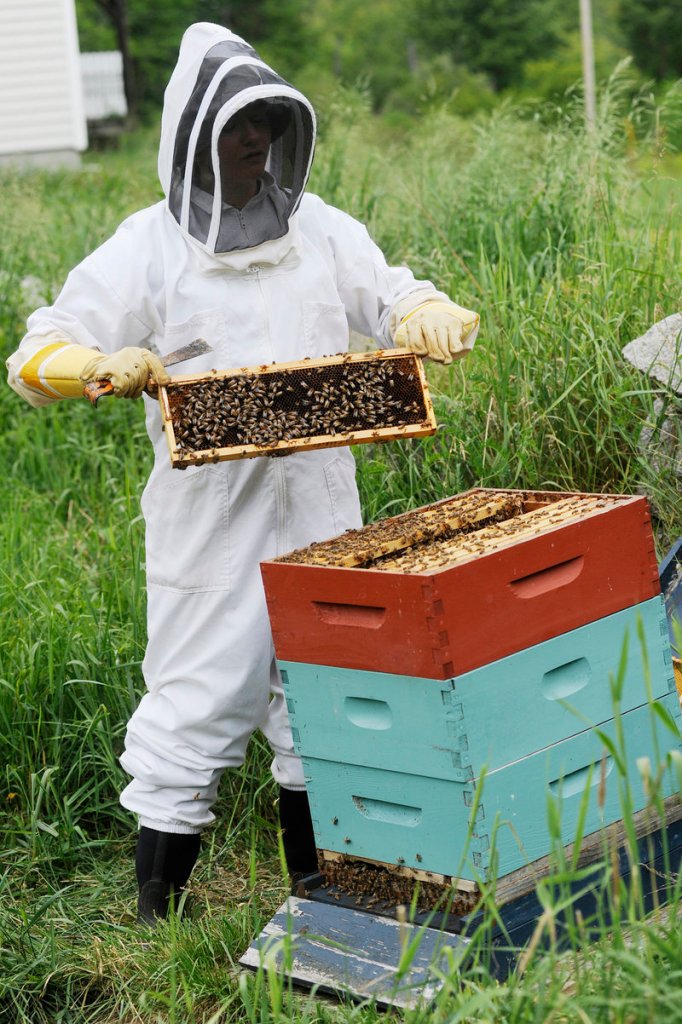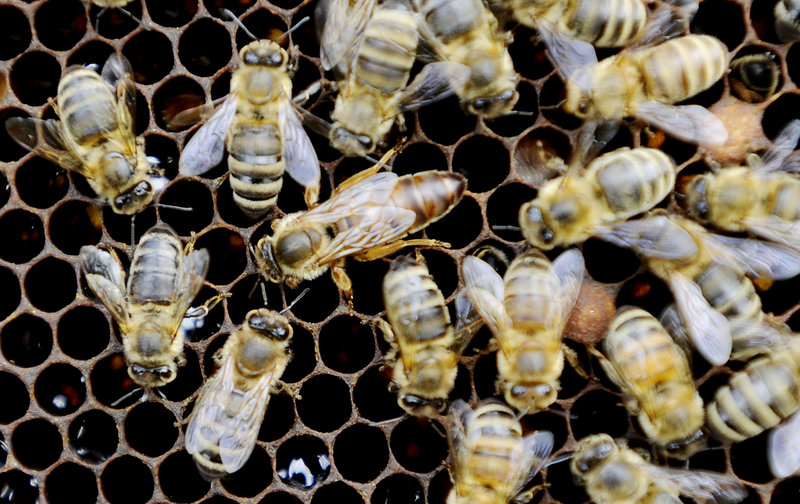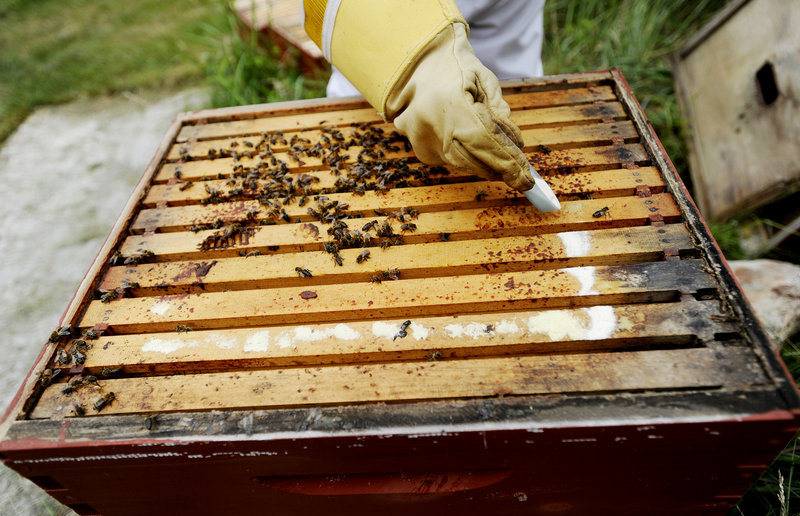ARUNDEL — Kirstan Watson enjoyed having dozens of honeybees buzzing around her as she inspected one of her three hives. At the other two stacked boxes, there were few bees in the air. But at the one healthy hive, Watson was like an air traffic controller at a busy airport.
“Sometimes I talk to them. They like to sit on my hand and I’ll ask them why they’re there,” Watson said as she slowly turned the frames from the hive.
Watson is one of a growing number of amateur Maine beekeepers learning to keep their honeybees healthy. It’s not only a tricky prospect, it’s the essence of beekeeping.
“A lot of beekeepers want to be bee-havers, not beekeepers. But you have to manage the hive. Being a beekeeper is taking an inventory, reading the frames. A honeybee colony left alone will die in three years,” said Geoff MacLean, a Scarborough beekeeper and instructor with the University of Maine Cooperative Extension.
More and more beekeepers in Maine are learning the art of nurturing healthy hives. According to the Maine Department of Agriculture, the number of registered beekeepers in Maine has grown from 246 in 2002 to 405 in 2007, to as many as 645 last year.
The membership in the Cumberland County Beekeepers Association alone has increased from as few as 30 beekeepers to as many as 200 today, MacLean said.
A hobbyist himself, MacLean likes it. He runs Red Brook Honey Farm in Scarborough, and believes in the idea of local farms and local foods.
“In the old days on my grandfather’s farm, there were all different kinds of animals and crops. And the bees there pollinated the apple trees. He didn’t hire someone,” MacLean said. “The more beekeepers, the more bees are kept correctly, the more pollination, the better people’s gardens, the better for farm stands and fruit stands.”
The downside to more new beekeepers is a higher incidence of disease, and there’s always one virus or another infecting hives, MacLean said.
“A lot of young beekeepers don’t want to treat it. They want to save a nickel so they use grandpa’s old equipment. But you risk infecting today’s colonies with yesterday’s equipment. American foulbrood spores can live for 70 years in Grandpa’s old equipment. The recommendation is to kill the bees and burn the equipment,” MacLean said.
The flipside to increased interest is that beekeepers staying with it are getting smarter and learning how to beat the diseases. Those like Watson don’t want to give up on their bees.
The Arundel beekeeper is lucky. Watson’s hives have European foulbrood, which is caused by a bacteria that grows in the soil and is easier to treat than American foulbrood.
But bees don’t fly in rainy weather, so during the wet days of May, Watson’s bees were confined and recovery from the bacteria was slow.
With applications of the antibiotic Terramycin and the brilliant sunny days last week, her bees finally started to get out and recover.
“When they got sick, I was depressed. I felt defeated. I froze. Then I realized this is an opportunity to see first-hand how they get sick and how to manage it. I’m starting to see healthy larvae. They’re not all shriveled and yellow. It’s not what I want but I’m seeing results. I’ll give them time,” she said, turning the frame.
A beekeeper of seven years, Watson was drawn to the craft at age 5.
It took six years before she and her husband, Chuck, saw their hives produce honey. They bought an extractor and enjoyed the fruits of their labor last year when the hives produced 20 pounds. They even sold their honey.
Now Watson is back at square one.
As she studied the frames taken from the hive boxes Monday, she looked for glistening white larvae, but found mostly yellow-colored and infected larvae.
If the hives don’t continue to rebound, she’ll “pinch” the queen and kill it to shrink the colony down, possibly to combine with a healthy hive. Then she’ll lose one of her three hives.
But no matter what, Watson won’t give up.
“Right now, I don’t care about honey,” she said.
Staff Writer Deirdre Fleming can be contacted at 791-6452 or at: dfleming@pressherald.com
Twitter: Flemingpph
Send questions/comments to the editors.






Success. Please wait for the page to reload. If the page does not reload within 5 seconds, please refresh the page.
Enter your email and password to access comments.
Hi, to comment on stories you must . This profile is in addition to your subscription and website login.
Already have a commenting profile? .
Invalid username/password.
Please check your email to confirm and complete your registration.
Only subscribers are eligible to post comments. Please subscribe or login first for digital access. Here’s why.
Use the form below to reset your password. When you've submitted your account email, we will send an email with a reset code.